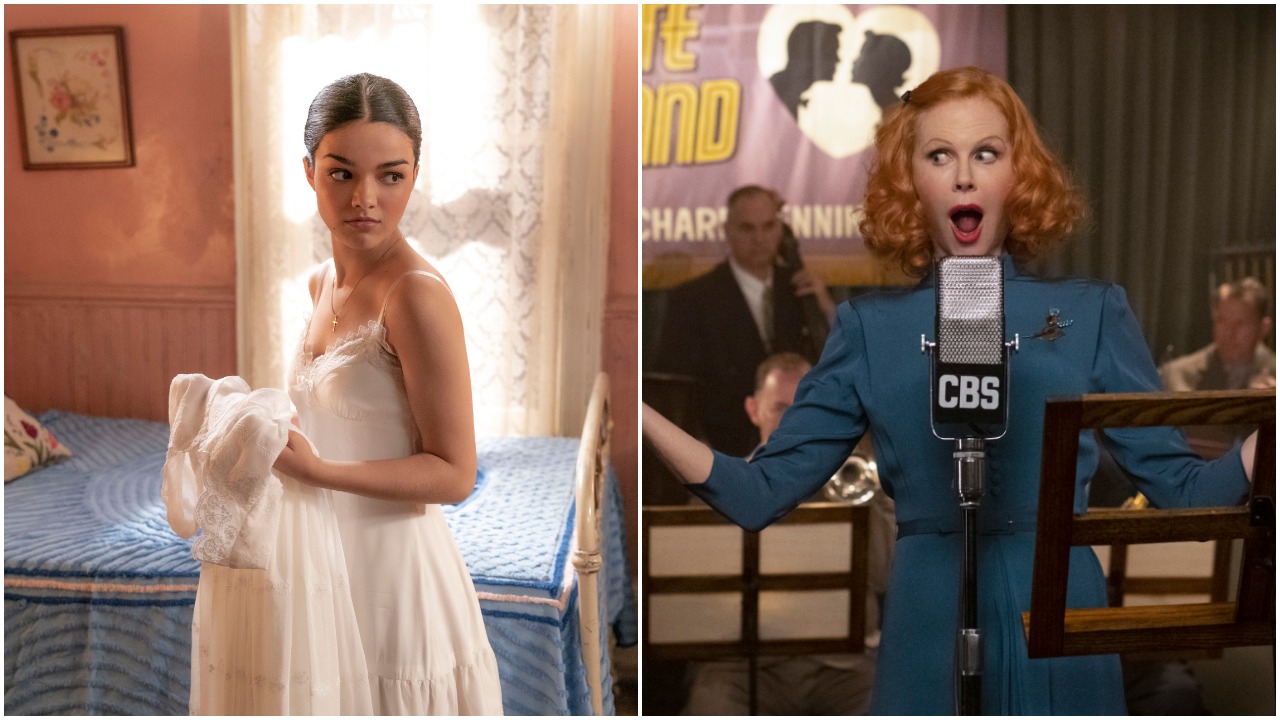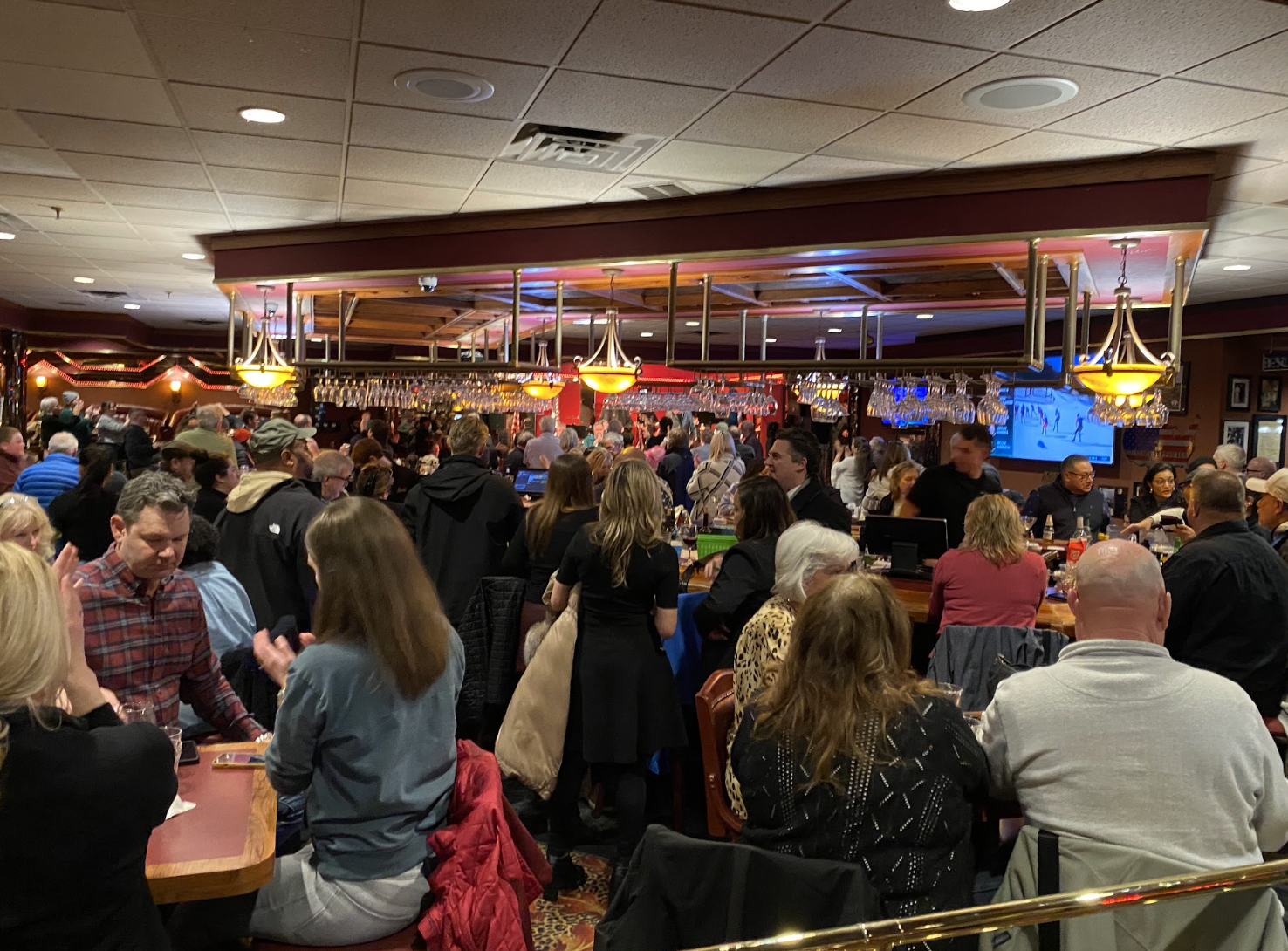West Side Story begins in the rubble, or rather above it, with an ostentatious but effective overhead shot of what we’re told is the future site of Lincoln Center, a current scene of desolation underscored by nearly Morricone-style whistles. The turf that we’ll watch racially antagonized kids kill for, we’re soon told explicitly, will be gentrified no matter which gang comes out on top. This is a contemporary story, director Steven Spielberg and screenwriter Tony Kushner want us to know, not just relevant but in accord with, you know, “our values.”
Of course, the original West Side Story had progressive intent too, viewing the moral panic of its day through a sympathetic liberal lens. Aside from the Communist, the ’50s imagination spawned no greater demon than the “juvenile delinquent,” a youth-gone-wild who was naturally scarier the browner his skin was. To say that the street gangs of post-war America were akin to the feuding families of Romeo and Juliet, and no less capable of poetry and grace, was a stroke of benignly patronizing sympathy.
Given Stephen Sondheim’s vernacular wit and an omnivorous Leonard Bernstein score and Jerome Robbins’s modernist street ballet, grown-ups might even tell themselves that a Broadway show could be as hip and relevant as rock ‘n’ roll, which seemed dead to some by the time the West Side Story movie soundtrack dominated a pre-Beatles album sales chart in 1962. Director Robert Wise seemed an ideal choice to bring the play to the screen—he was known for emphasizing messages of racial tolerance in his pictures, after all.
But the movie, like the stage version before it, was awash in brownface and accents that’d make Jared Leto squirm. Rita Moreno had to darken her skin, and yeah, sure, racist white parents might have been much more understanding if the supposedly Puerto Rican girl their son was bringing home turned out to be Natalie Wood. And why’s the first major film representation of Puerto Rican characters got to be as gang members? (Don’t answer that.) Anyone frustrated with West Side Story as a landmark example of the unexamined racism of well-meaning liberals putting their stamp on popular culture has got a strong case that this white reviewer’s got no ground to rebut.
But a landmark it is, and actors of Latin descent reclaiming iconic roles in American musical theater history is overdue. Ideally someone more, uh, culturally appropriate than Spielberg or Kushner would have brought West Side Story into the 21st century—you can guess which of their decisions will someday chafe, if they don’t already. But these guys ain’t hacks, and neither were the guys who made the original. A teen girl gasped at the first onscreen appearance of a switchblade. “Tonight” still sounds how a crush feels. I giggled at the end of a sharply arranged “Gee Officer Krupke” (which still brilliantly deconstructs the show’s own liberalism), felt my heart race at the buildup to the rumble, and choked up at Maria’s climactic speech. If you want a big screen movie musical, this is the kind that demands and deserves cornball raves like “It’ll knock your socks off.” And if you want to make a big screen movie musical, this is the new standard.
Kushner’s Jets are essentially proto-fascist dead-enders just waiting for someone to tell them where to throw the brick. Until then, they’re leaping fences with paint cans and going Jackson Pollock on a street mural of a Puerto Rican flag. The Puerto Rican gang members in the Sharks are no less headstrong, but they’re also clearly depicted as members of a community looking out for each other. The Spanish-speaking characters slide between between languages without subtitles, emerging as three-dimensionally as anyone in a rehabbed 65-year-old musical can.
Now let’s get to the fun part. West Side Story is mostly about kids dancing and brawling and singing and falling in love (OK, and murdering each other). Much has been made of the fact that this is Spielberg’s first musical, but he’s done plenty of action movies, so he understands a basic fact that the Rob Marshalls and Jon Chus inexplicably don’t: Audiences need to see what’s happening. After silently screaming “WHERE ARE THEIR LEGS?” during filmed dance numbers or enduring repeated cuts away from dancers to pointless reaction shots, I’m happy to report that Justin Peck (who adapted Robbins’s original work) is the first choreographer in years who’s not entitled to take his director to court for professional malpractice. Throughout the camera follows the action as smoothly as your own eyes would.
A West Side Story is only as good as its Maria, and YouTube discovery Rachel Zigler glides from dewy-eyed debutante to grieving, embittered lover without a hitch. She excels at little moments, as when she wakes up in her party dress the night after falling in love, rushes to mess up her room, and pauses while pulling on her robe to remember the night before with a sigh. She’s impulsive (making the first move on her new crush) yet tough (pushing back when he makes excuses for his friends’ violence). Terrible things should not happen to this person.
Alas, she has the misfortune of falling for Tony, who’s not just white and not just a Jet but is played by the inert Ansel Elgort. He’s tall, he’s lippy, he’s athletic—when he leaps up on that fire escape, you can see why Maria’s smitten. But when he tries to smolder it’s like he stepped on a rake, and when he tries to sneer it’s like he’s smelled a fart. And though he sings pretty, his dead eyes never glisten with the sense of anticipation that “Something’s Coming” or “Maria” require. Tall white guys are abundant and low value, and Spielberg could’ve done better than Elgort even without taking into account allegations against the actor of sexual abuse and grooming teen girls.
But the supporting cast lives up to that term, propping up the story where needed. Mike Faist is a wiry Riff, inflecting his requisite Bowery Boys whine of the Jets’ chief with an aggrieved nihilism. And as Maria’s brother Bernardo and her confidante Anita, David Alvarez and Ariana DeBose, burn with the chemistry and argue with the familiarity of a real couple. When they stroll into the school dance like they own it, they are hot shit. No wonder the whites are so intimidated.
The songs are still great, whatever Sondheim thought. Bernstein arranged horns like his favorite jazz artist was Kurt Weill and conducted a rhythm section like his favorite Latin composer was Cole Porter—if you’re looking for authentic here, forget it, Jake, it’s Broadway. And with slight modifications, the script accentuates the dramatic role of the songs, so that even the showstoppers advance the plot. “America,” originally a debate over the Puerto Ricans’ new home between Anita and other women, is recast as her sparring match with Bernardo. “Cool,” the most marooned number in the show, is choreographed smartly as a struggle over a handgun.
Is there anything wrong with West Side Story? Of course—it’s a Spielberg movie. Whenever he’s not quite convinced you’re feeling enough, he’ll show a moved, upset, or angry character to egg you on. Kushner overloads its characters with backstory, as though every action needs a biographical explanation. And, yeah, that fuckin’ sex creep Baby Driver is the male lead.
But Spielberg and Kushner get that West Side Story is a story about a place—the musical ain’t called Tony & Maria or Jets & Sharks, after all. The ensemble numbers sprawl into the streets, utilizing New York City as the ultimate open-air performance space. And the focus on displacement and gentrification is sharpened with a big change from the original.
Particularly given her long, vexed relationship to West Side Story and the film industry generally, it’s hard to begrudge Rita Moreno, 90 years old tomorrow, when she takes over “Somewhere.” Typically sung by Tony and Maria as the racially star-crossed lovers’ plea for a color-blind future, from Moreno’s Valentina, the song becomes a generalized humanist wish that everyone, from the misfit whites to the migrant Puerto Ricans, will someday find a home. It’s truer that way, and cornier this way, and maybe your grandkids will wince at it in 2081. That’s just how musicals are sometimes.
Aaron Sorkin’s gift for implausibility is unmatched by any writer and director working today. No sentence, action, or historical fact can, once Sorkinized, seem real ever again. I do not believe anything in Being the Ricardos happened that way, even if it did. By the end of the movie, I was no longer even sure Lucille Ball ever existed.
Being the Ricardos focuses on a single week in the production of I Love Lucy. During that time, Ball (Nicole Kidman) fends off rumors (truths, actually) that she was once a Communist, Desi Arnaz (Javier Bardem) dodges allegations (again, truths) that he’s been fucking around on his famous wife, and both husband and wife announce to CBS and its advertisers that Ball is pregnant and wants, shockingly, to work that unavoidable development into the show’s scripts.
That’s enough. That’s more than enough. Stop there. But no. Vivian Vance (Nina Arianda) resents her character’s frumpiness. Bill Frawley (J.K. Simmons) is on the sauce again. The writers (Alia Shawkat and Jake Lacy) are squabbling. The executive producer (Tony Hale) is weaseling out. There are flashbacks to Lucy and Desi’s pre-TV life and, on top of that, a faux documentary framing device featuring contemporary versions of three of the people we see working on I Love Lucy in the past, as though Sorkin is terrified that something might accidentally go un-exposited.
Being the Ricardos has a pretty swift current, and so you might get swept along for a bit. Sorkin’s game is to keep so many balls (sorry) in the air he distracts you from the fact that the film’s hyperactivity seems to be its sole purpose, just as he distracts you from the flatness of his wit by having his actors quicken the pace. A Sorkin joke is when someone says something—anything—really fast and someone else replies faster. The banter here is breakneck and mundane, like Abbott & Costello doing Harold Pinter, but in a bad way.
Nicole Kidman plays Ball as a raspier Nicole Kidman, her smooth, haunted-doll face a constant reminder that she’s not Lucy. The lack of physical resemblance isn’t what trips Kidman up though—it’s her own star power, which prevents her disappearing into the role of an even greater star. Bardem is more loose and lively as the compulsively charming Arnaz, and the professional partnership between the two is fascinating on the few occasions that they get to act as humans rather than Sorkinbots.
Instead, we get speeches, because Aaron Sorkin’s America is a very simple place where good people get what they want by standing firm and telling their adversary off perfectly. It’s a childish worldview that’s at the heart of U.S. politics—if only someone could tell Joe Manchin off in the exact right way, America would be saved—and for his fans, it’s a feature not a bug. Sorkin really seems like the kind of guy who spends a lot of time "thinking about what I should have said" after an argument, then he plops his comebacks into his scripts. Anyway, the House Un-American Activities Committee, anti-Cuban racism, and not being allowed to say “pregnant” on TV were all clearly very bad things, but you don’t get points for calling them out in 2021.
As forI Love Lucy itself, we’re reminded of its off-the-charts popularity repeatedly, but Sorkin has no particular interest in why viewers loved Lucy, or what made Lucille Ball a genius. He shows her attention to detail, and follows her thinking through certain bits, but in a very mechanistic way, as though all it took was hard work. If it was that easy, Being the Ricardos would be an instant classic.
West Side Story and Being the Ricardos open in area theaters Friday, December 10.
Special Screenings This Week
Thursday, Dec. 9
My Neighbor Totoro
AMC Eden Prairie 18/AMC Rosedale 14/AMC Southdale 16
Imagine taking your kid to see this in a theater. How hard would that rule? $13.44 7 p.m. More info here.
Scrooged (1988)
Parkway Theater
Thirty-three years too late, it occurs to me that this is a pun on “screwed,” isn’t it? $9-$12. 8 p.m. More info here.
Lineas de Sangre (2021)
Trylon
A dance film by choreographer Taja Will and filmmaker Sequoia Hauck. $20 advance/sliding scale $5-$50 at doors. 7 p.m. Also 5 p.m. Saturday. More info here.
Friday, Dec. 10
A Christmas Story (1983)
Riverview Theater
A school bus was recently held up right outside the house used for this movie. See? $4 ($2 with food shelf donation). Friday-Saturday 4:15. Sunday 3:15. More info here.
Elf (2003)
Riverview Theater
Hide your cats! Everyone’s favorite visitor from Melmac is back and—oh, sorry, it’s Elf. (No I will not stop making this joke till after Christmas.) $4 ($2 with food shelf donation). Friday-Saturday 6:30. Sunday 5:15. More info here.
It’s a Wonderful Life (1946)
Riverview Theater
The only Christmas movie that understands why the holidays make us suicidal. $4 ($2 with food shelf donation). Friday-Saturday 8:30. Sunday 7:15. Monday & Wednesday 4 p.m. Tuesday 6:30 p.m. More info here.
White Christmas (1954)
Riverview Theater
Bing Crosby! Danny Kaye! Rosemary Clooney! Vera-Allen! Christmas! Vermont! $4 ($2 with food shelf donation). Friday-Saturday 1:45 p.m.. Sunday 12:45 p.m. Monday & Wednesday 6 p.m. Tuesday 4 p.m. More info here.
Double Indemnity (1944)
Trylon
You don’t see too many murderous life insurance salesmen in movies these days. $8. 7 & 9:15 p.m. Friday and Saturday. 3 & 5:15 p.m. Sunday. More info here.
Saturday, Dec. 11
The Holiday (2006)
Alamo Drafthouse
A Brit and a Yank swap places and meet boys. Now that’s what I call a holiday! $10. 11:30 a.m. More info here.
The Magic Flute (live)
AMC Eden Prairie 18/AMC Rosedale 14/AMC Southdale 16
Julie Taymor’s staging for the Met. $10. 12:55 p.m. More info here.
It’s a Wonderful LIfe (1946)
Parkway Theater
The movie that taught kids raised on Nick at Nite that young Donna Reed was a total fox. $5-$10. 1 p.m. More info here.
Boris (2021)
Trylon
Dmitry Krymov reimagines Pushkin. 4 p.m. $15/$5 students. More info here.
Sunday, Dec. 12
Meet Me in St. Louis (1944)
Alamo Drafthouse
Four sisters (including noted local Judy Garland) come of age in turn of the century St. Louis. $10. 11:30 a.m. More info here.
On Golden Pond (1981)
AMC Eden Prairie 18/AMC Rosedale 14/AMC Southdale 16
Celebrate the 40th anniversary of the last time anyone watched On Golden Pond. $13.44. 3 & 7 p.m. Also 7 p.m. Wednesday. More info here.
Boyfriends and Girlfriends (1987)
Trylon
A collection of young French professionals fall in and out of love and, this being an Erik Rohmer film, talk about it all a lot. $8. Sunday 7:30 p.m. Monday and Tuesday 7 & 9 p.m. More info here.
Monday, Dec. 13
Edward Scissorhands (1990)
The Heights
That-a Johnny Depp, he make-a me cry. $12. 7:30 p.m. More info here.
Tuesday, Dec. 14
Macross Plus (Movie Edition) (2021)
AMC Rosedale 14/AMC Southdale 16/Showplace ICON
A four-part anime series collected into a single theatrical version. $10. 7 p.m. More info here.
Wednesday, Dec. 15
Last Ounce of Courage (2012)
Trylon
An American Hero is jailed for putting up a Christmas tree, as totally happens all the time. $5. 7 p.m. More info here.
Opening This Week
National Champions
They're just putting J.K. Simmons in all the movies now, huh?
Ongoing in Local Theaters
Clifford the Big Red Dog
C'mon C'mon (read our review here)
Dune (read our review here)
Encanto
The French Dispatch (read our review here)
The Green Knight
Ghostbusters: Afterlife (read our review here)
House of Gucci (read our review here)
King Richard
No Time to Die (read our review here)
The Power of the Dog (read our review here)
Resident Evil: Welcome to Raccoon City
Sword Art Online Progressive: Aria of a Starless Night
Wolf






